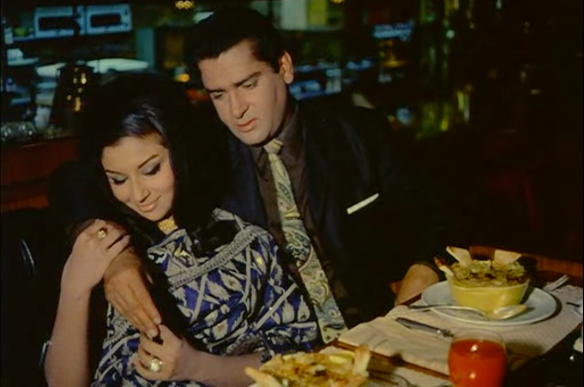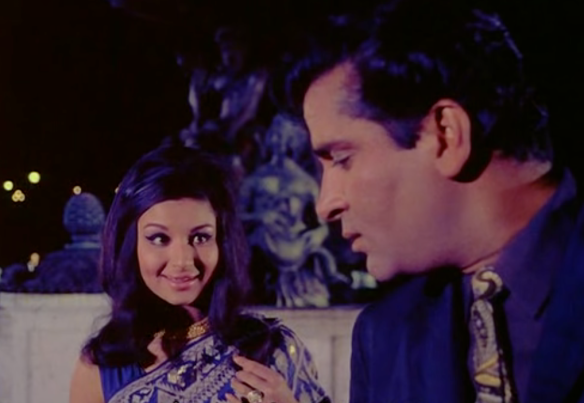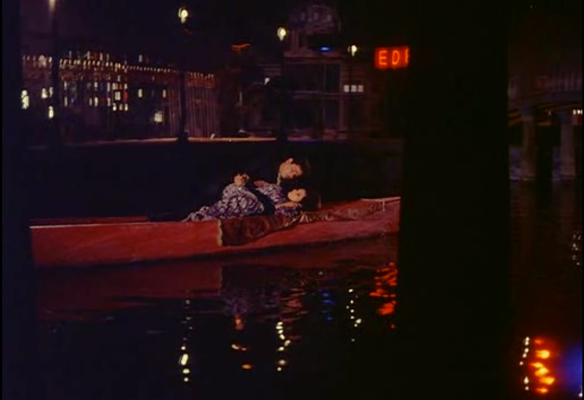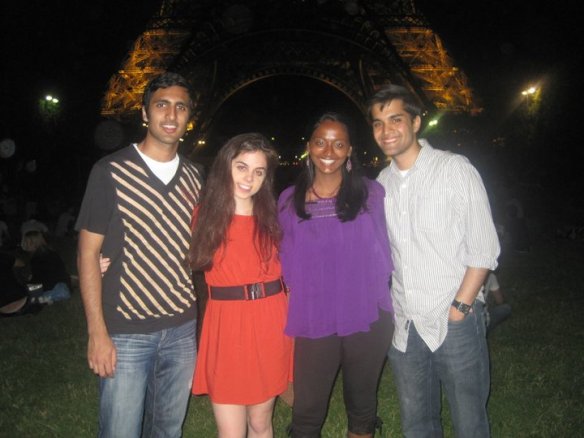“If you are lucky enough to have lived in Paris as a young man, then wherever you go for the rest of your life, it stays with you, for Paris is a moveable feast.”
This quote by Ernest Hemingway is perhaps my favorite description of Paris, the quintessential city of lights and love. Being in Paris is truly a feast for all senses, but it is an opportunity that the average citizen in 1960s India would never receive. Not in person, at least.
In the 1960s, the advent of a new escapist genre of films allowed Indian audiences to be transported to exotic cosmopolitan locales through cinema. Films like Love in Tokyo (1966) and Night in London (1967) offered Indian movie-goers the chance to catch a glimpse of foreign culture from the comfort of their seats in a movie theater. In these tourist fantasies, consistency in plot and character development was not important; the real star of the show was the international destination being featured in the film. The lyrics and English translation that we have provided today come from one of this genre’s most well-known examples: Shakti Samanta’s An Evening in Paris (1967) starring Sharmila Tagore and Shammi Kapoor.
The soundtrack for this film, composed by Shankar-Jaikishan and penned by Shailendra/Hasrat Jaipuri, contains a number of memorable hits. Yet, in my opinion, “raat ke hamsafar“ stands out from the rest for its beautiful melody, poetic lyrics, and passionate rendition by Mohammed Rafi and Asha Bhonsle. This romantic duet reflects a strong Western musical influence, which is enhanced by the gorgeous strings-centered orchestration and the non-traditional modulations in Rafi and Asha’s voices.
To bring an interesting perspective that may not be known to all fans of this song, there is a story behind its making that has been narrated by Nandu Chawathe, a musician in Shankar-Jakishan’s troupe. In a tragic turn of events, composer Shankar’s mother died the same morning that a musical sitting was planned for “raat ke hamsafar.” Jaikishan, Shammi Kapoor, and others were waiting for Shankar, but most of the group left after hearing the news under the assumption that Shankar would like to take the day off. When Shankar arrived late, he asked Nandu Chawathe why everyone had left before the sitting occurred. Shankar was angry when he realized everyone had left and canceled the sitting without telling him when it was his mother who had died. An evening sitting was rescheduled the same day. When Shankar arrived, he turned off all the lights and lit a candle, much to everyone’s surprise. He hummed the opening line of “raat ke hamsafar,” and everyone was stunned instantly. The first line of the mukhDaa was even Shankar’s own words! Shammi Kapoor approved the composition, Shailendra finished out the rest of the lyrics, and a treasured gem of Hindi film music was born.

Sharmila Tagore and Shammi Kapoor snuggle in a Parisian cafe as they enjoy a late-night snack–French onion soup!
Raat Ke Humsafar: Lyrics and Translation
raat ke hamsafar thak ke ghar ko chale.n
Oh companion of the night, let us wander home wearily,
jhuumtii aa rahii hai subaah pyaar kii
as the dawn of love arrives, swaying about.
dekh kar saamne ruup kii raushnii
After encountering the light of your beauty,
phir luTii jaa rahii hai subaah pyaar kii
the dawn of love is being stolen away.
sonevaalo.n ko ha.ns kar jagaanaa bhii hai
Those who are sleeping are to be awakened with a smile.
raat ke jaagato.n ko sulaanaa bhii hai
Those who have stayed awake tonight are to be lulled to sleep.
detii hai jaagne kii sadaa saath hii
Though it also gives the call to awaken,
loriyaa.n gaa rahii hai subaah pyaar kii
this dawn of love evokes calm by singing lullabies.
raat ne pyaar ke jaam bhar kar diiye
The night has filled our wine goblets of love.
aankho.n-aankho.n se jo mai.ne tum ne piiye
You and I drank from them with our eyes.
hosh to ab talak jaa ke lauTe nahii.n
After leaving us, our consciousness has yet to return.
aur kyaa laa rahii hai subaah pyaar kii?
What else does this dawn of love have in store?
kyaa kyaa vaade hue, kis ne khaayii qasam?
What promises were made tonight? Who has sworn to new vows?
is nayii raah par ham ne rakhe qadam
Upon this new path, we have taken our first steps.
chhup sakaa pyaar kab? ham chhupaaye.n to kyaa?
When could our love be hidden? Even if we could, so what?
sab samajh paa rahii hai subaah pyaar kii
This dawn of love is able to understand everything.
raat ke hamsafar thak ke ghar ko chale.n
Oh companion of the night, let us wander home wearily,
jhuumtii aa rahii hai subaah pyaar kii
as the dawn of love arrives, swaying about.
Glossary
hamsafar: companion; thaknaa: to be tired, weary; jhuumnaa: to sway; subaah: dawn; ruup: beauty; raushnii: light; luTaa jaanaa: to be stolen away; jaagat: one who is awake; sulaanaa: to lull to sleep; sadaa: call; saath hii: also; lorii: lullaby; jaam: wine goblet; hosh: consciousness; ab talak: yet; vaadaa: promise; qasam khaanaa: to take a vow; qadam rakhnaa: to take steps; chhupaanaa: to hide; samajh paanaa: to be able to understand.
As an aside, I thought that I would say a word about the time that I spent in Paris during the summer of 2011! I was fortunate enough to receive a fellowship to conduct a research internship for three months in a cancer immunology laboratory at the Institut Curie. Besides the academic opportunities presented to me in the lab, my summer in Paris was a formative experience in terms of cultural enrichment and personal growth. I always look back fondly upon the time I spent in Paris, and the memories of that summer have stayed with me ever since. In keeping with the theme of this post, a couple of my pictures of Paris by night are presented below. Enjoy! À bientôt!






